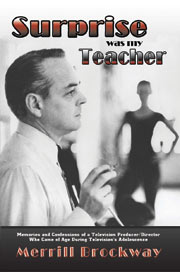(Sunstone Press, 208 pages, $19.95)
By Merrill Brockway
 Merrill Brockway belongs to that bustling generation that returned from World War II, earned its education on the GI Bill (his at Princeton), and then moved into an optimistic postwar future where the maps were not yet drawn. In no place was the topography less defined than in the nascent television industry, and Brockway became one of those pioneers who, through trial and error, and sometimes simply by feeling blindly for a path in the dark, created arts programming as we now know it. His specialty was directing performing arts, but his apprenticeship had him mastering three-camera shooting on kids' puppet shows, live sports, and anything else that came his way.
Merrill Brockway belongs to that bustling generation that returned from World War II, earned its education on the GI Bill (his at Princeton), and then moved into an optimistic postwar future where the maps were not yet drawn. In no place was the topography less defined than in the nascent television industry, and Brockway became one of those pioneers who, through trial and error, and sometimes simply by feeling blindly for a path in the dark, created arts programming as we now know it. His specialty was directing performing arts, but his apprenticeship had him mastering three-camera shooting on kids' puppet shows, live sports, and anything else that came his way.
After learning his trade in Philadelphia, he moved to CBS-TV's Camera Three in New York in 1962 and became a DGA member. With musical training and an open mind about the avant-garde, Brockway found himself at the epicenter of modern music and dance. Collaborating with choreographer George Balanchine, Brockway developed a set of basic principles for shooting and editing dance on TV. For instance, "the edit should fall only on the dancer's out-breath." CBS needed 48 weeks of Camera Three each year (on a "pittance" of $25,000 per show), and this hungry slot drove Brockway to fevers of invention and exploration. Fortunately, as Brockway notes in his warm and generous memoir, a Sunday morning time slot meant that the network executives were on the golf course and the philistines were in church.
Later he worked in a similar vein for PBS' Dance in America and American Masters. His book lovingly details a happy, demanding life among the giants of postwar performing arts: Balanchine, Merce Cunningham and John Cage, Twyla Tharp, enfant terrible Pierre Boulez, and aging geniuses like Martha Graham, Tennessee Williams and Stella Adler. And all this was achieved in the larger context of TV "as a vast wasteland" of culture. We would be lucky to have Brockway doing this kind of programming today.
Review written by John Patterson.